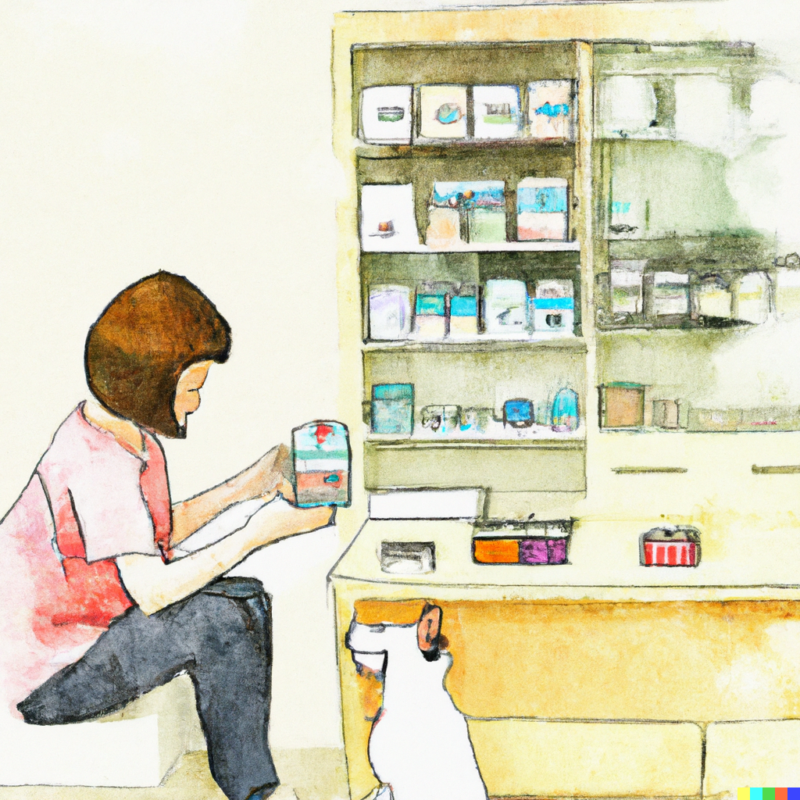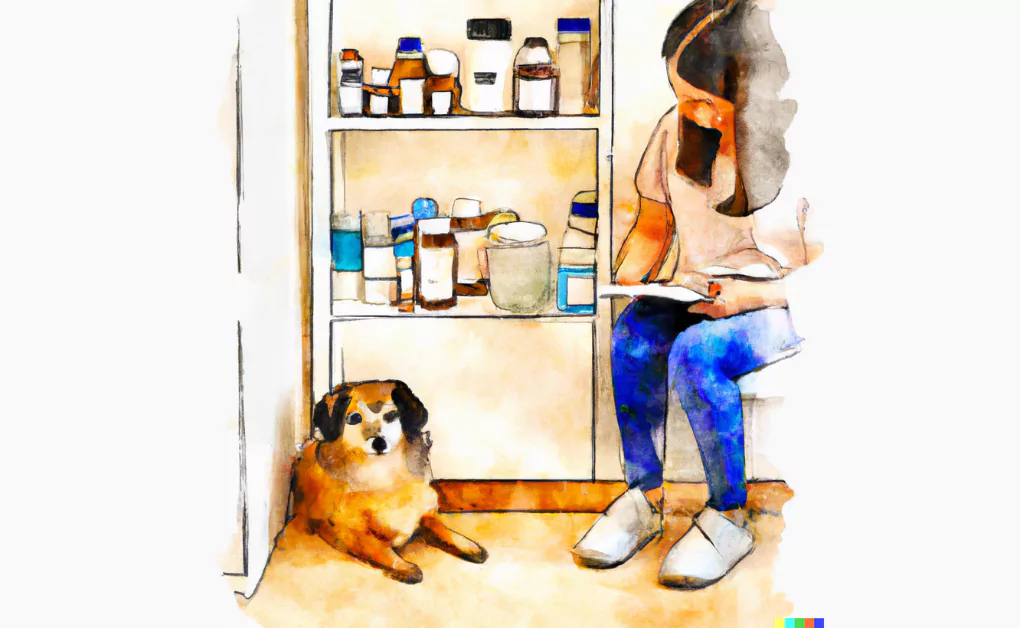Expired Drugs in Your Pet’s Medicine Cabinet
Introduction
Late one night, Karen found herself frantically searching her pet’s medicine cabinet for something to ease her dog Bella’s sudden discomfort. Desperate to help, she administered the first medication she found, only to realize moments later that it had expired months ago. Panic set in as she wondered what the consequences might be. It’s important to keep a close eye on expiration dates, understanding the potential risks of using expired pet medications, and how to properly dispose of them.
Have you ever taken a detailed look at what’s actually in your pet’s medicine cabinet? As devoted pet parents, we understand the importance of preparing for health emergencies that might affect our furry friends. Our cabinets are meticulously filled with various medications, ranging from flea and tick preventatives to antibiotics, pain relief, and maybe a remaining pill or two from a previous health issue. These medicines symbolize our readiness to care for our pets when unwell promptly.
Despite this, while a well-equipped cabinet can be a lifeline, it can also conceal unnoticed dangers that pet owners might unwittingly neglect: expired medications. Much like medicines intended for humans, pet medications come with expiration dates, and the use of these unused or expired drugs can result in unexpected ramifications. In this blog post, we’ll explore the significance of keeping track of these expiration dates, the hazards associated with using expired medications, and strategies to manage and organize your pet’s medicine cabinet safely and efficiently.
In the quest to administer a dose of unused medications at home, it’s easy to overlook that these may be years beyond their manufacturing date. While some drugs might be as good as the manufacturers say even after the expiry date, it’s important to remember that manufacturers only test drugs at the time of production for a specific shelf life. Therefore, professionals recommend following the stated expiry dates for optimum effectiveness and safety. Thus, a part of pet care is regularly cleaning out your medicine cabinet to discard expired prescription medicine.
What Does an Expiration Date Mean on Your Pet’s Medicine?

Like with food products or human medication, an expiration date on your pet’s medicine serves an important purpose. It represents the final date the manufacturer assures the medication’s full potency and safety. Past this date, the medication may have decayed, lost its potency, or altered its chemical composition, which can potentially harm your pet. Notably, most medicines—excluding some controlled substances—retain around 70 to 80% of their efficacy for at least one to two years post-expiry.
Pharmaceutical companies undertake stringent testing procedures to ascertain how long medications maintain their potency under specific storage conditions. These procedures result in the formulation of a designated period during which drugs are projected to maintain their quality and effectiveness.
Using medications beyond their expiration dates equates to taking a risk. Some drugs may see their effectiveness, while others may develop into an undesirable substance or undergo chemical changes that make them hazardous or, at the very least, unpredictable in their effects. It’s important to record these details in your pet’s medical record for future reference.
While it’s true that certain drugs may not show immediate changes or cause harm right after their expiry date, the associated risk escalates significantly with time. This is why managing your pet’s home medicine cabinet and routinely checking for expired medications is crucial.
Regarding disposal, discarding medicines like controlled substances directly into household trash is not advisable. Instead, please place them in a sealable bag, ideally within their original container, to avoid confusion or accidental ingestion. This applies to all forms of medication, including syringes, tablets, or liquids. Proper management and disposal ensure your pet’s safety and reduce the risk of unintended consequences.
Best Way to Dispose of Expired Medications
When properly disposing of expired pet medications, ensuring a safe method for the environment and all living beings is vital. Inappropriate disposal practices, like flushing medications down the toilet or tossing them in regular trash, can lead to environmental pollution and accidental poisoning by wildlife or children. So, how exactly can you safely get rid of expired pet medications?
Drug Take-Back Programs
Drug take-back programs offer a secure, easy, and responsible way of disposing of prescription medications, including pet-specific ones. Local pharmacies, government bodies, or waste management services might host these programs. Some places have permanent collection sites, while others arrange intermittent take-back events, such as the annual drug take-back day. To find a program nearby, check out the U.S. Drug Enforcement Administration’s website or contact your local waste disposal unit or government office.
Disposal at Home
If there’s no take-back program accessible in your locality, it’s possible to dispose of certain medications at home in a way that lessens potential risks. Don’t merely throw the medication into the trash where kids or pets could stumble upon it. Instead, blend the medication with an undesirable substance like used coffee grounds or soiled cat litter. This approach makes the leftover medication less appealing to kids and pets and unidentifiable to individuals who may be intentionally looking for drugs in your trash. Enclose this blend in a sealed plastic bag and dispose of it with your regular household trash during spring cleaning.

Consult Your Veterinarian or Pharmacy
Veterinarians and pharmacists have in-depth knowledge about medications and can guide you on their safe disposal. They might even operate a disposal program or direct you toward local resources. It’s always a good idea to ask for their advice for any confusion or clarification regarding a specific medication. Bear in mind that pharmacists must attach a one-year expiration date to certain medications and comply with pharmacy regulations, which may include providing advice on proper disposal methods.
Follow FDA Guidelines
The U.S. Food and Drug Administration (FDA) provides guidelines on correctly disposing of various medications. This includes details about which drugs can be flushed down the toilet, a small group mainly composed of human medications. When dealing with an unfamiliar medication, refer to these guidelines.
Do not Flush It Down the Toilet
Unless explicitly mentioned in the FDA guidelines, never flush medications down the toilet. While designed to manage various waste types, sewage treatment facilities may only eliminate some medication residues. These residues can end up in rivers, lakes, and marine environments, threatening aquatic life. Similarly, medications disposed of in the trash can end up in landfills and potentially seep into groundwater.
The expiration dates pharmacists must attach to medications might sometimes seem consumer friendly to arbitrarily set higher bars on some products. Still, the guidelines are designed to ensure maximum safety and effectiveness. Pet owners wouldn’t want to be legally responsible for any mishaps caused by improper disposal or use of expired medications. Therefore, to prevent prescription drug abuse and ensure unwanted medication does not spill into our environment, it’s imperative to follow these steps for responsible disposal.
How Should I Store My Pet’s Medicines to Maintain Their Shelf Life?
Preserving the effectiveness of your pet’s medication up until its expiration is reliant on proper storage. Here are several recommendations to consider:

- Adhere to Specific Storage Instructions: Certain medications, such as OTC (over-the-counter) drugs and others, might have unique storage prerequisites, like refrigeration or shielding from light. It’s important to follow these guidelines, typically stated clearly on the medication label or the packaging.
- Opt for Cool, Dry Storage: Unless otherwise instructed, most medications should be stored in a cool, dry location. Medications exposed to extreme temperatures or humidity can get damaged, potentially losing effectiveness or being harmful. Drugs under warm conditions, such as those stored in a bathroom cabinet, can become less potent over time.
- Maintain Original Packaging: Aim to keep medications in their original packaging until they are used. This not only aids you in distinguishing between different medications and their respective dosages but also preserves the medication’s integrity. The packaging is explicitly designed to safeguard the medication from environmental elements like light and moisture that could deteriorate it.
- Shield from Sunlight: Direct exposure to sunlight can degrade some medications, diminishing their effectiveness. Therefore, it’s best to store medications in a dark location or within containers that obstruct light.
- Secure in Child and Pet-Safe Areas: It’s crucial to store medications in areas inaccessible to children or pets. A high, secure cabinet that can be firmly closed serves as an optimal option.
- Routine Inspections: Regularly monitor the expiration dates of all medications and dispose of any that have reached their expiration. Remember that many medications’ expiration date is always one year from the prescription date.
Remember that each medication may have unique storage requirements, and it’s always best to seek advice from your vet or pharmacist when in doubt. While many may argue that the expiration date on meds might be lined for those who lobby in their favor, it’s best to abide by them for maximum safety.
If stored properly, only used medicines could lead to an owner deciding to stop a med prematurely or pose a risk to others if left unsecured. In a scenario where guidelines are unclear, you are enjoined to do so regardless and initiate an operation medicine cabinet cleanup to ensure safe storage conditions.
While some might concede to the second point that certain medications like antibiotics might still hold potency beyond the stated expiry date, it’s best to err on the side of caution and stick to professional guidelines for optimal pet health.
Frequently Asked Questions
Disclaimer: The information provided on this veterinary website is intended for general educational purposes only and should not be considered as a substitute for professional veterinary advice, diagnosis, or treatment. Always consult a licensed veterinarian for any concerns or questions regarding the health and well-being of your pet. This website does not claim to cover every possible situation or provide exhaustive knowledge on the subjects presented. The owners and contributors of this website are not responsible for any harm or loss that may result from the use or misuse of the information provided herein.







